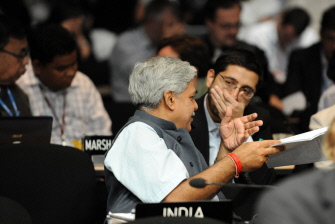Key points in climate agreement
Major powers including the United States, European Union, China, Japan and India all endorsed the deal. Bolivia was the only major holdout, but host Mexico overruled its objections.
 |
| Representatives of India go through documents during the COP16 United Nations Climate Change conference on December 10, 2010 in Cancun, Mexico. AFP |
Here are some key points in the agreement:
ACTIONS TO CURB CLIMATE CHANGE:
-- Urges "deep cuts" in carbon emissions blamed for global warming to keep temperatures from rising no more than two degrees Celsius (3.6 Fahrenheit) above pre-industrial levels. Calls for a study on strengthening the goal to 1.5 degrees.
-- Requires wealthy countries to cut emissions by 25 to 40 percent by 2020 compared with 1990 levels. This section is under a working group on the Kyoto Protocol so it does not involve the United States, which rejected the treaty.
-- Agrees to study new market mechanisms to help developing nations curb carbon emissions and to discuss the proposals at the next major climate meeting at the end of 2011 in South Africa.
ASSISTANCE FOR DEVELOPING COUNTRIES:
-- Sets up a new international body, the Green Climate Fund, to administer money from wealthy nations for worst-affected countries. The European Union, Japan and the United States have led pledges of 100 billion dollars a year up to 2020, along with 30 billion dollars in rapid assistance.
-- Invites the World Bank to serve as the interim trustee of the Green Climate Fund for three years.
-- Sets up a 24-member board to lead the Green Climate Fund, with equal representation by developed and developing nations along with representatives from small island states which are most worried about climate change.
-- Sets up a Climate Technology Center and Network to help distribute the technical know-how to developing nations to contain emissions and adapt to climate change.
REDUCING DEFORESTATION:
-- Voices broad support for efforts to reduce the destruction of forests, a leading cause of climate change as lush vegetation counteracts industrial pollution. Asks developing nations to draft anti-deforestation plans. However, the text does not include calls for a market role in such efforts.
-- Urges all nations to respect the rights of indigenous people.
FUTURE OF KYOTO PROTOCOL:
-- Calls for wealthy nations to discuss a new round of emission cuts under the Kyoto Protocol -- whose requirements expire at the end of 2012 -- "to ensure that there is no gap."
It does not require nations for now to inscribe their post-2012 commitments under the Kyoto Protocol. Japan has led opposition to extending the treaty, saying it is unfair by not including China and the United States.
What the stars mean:
★ Poor ★ ★ Promising ★★★ Good ★★★★ Very good ★★★★★ Exceptional
Related Contents
Latest News
More News
- Russian President congratulates Vietnamese Party leader during phone talks (January 25, 2026 | 09:58)
- Worldwide congratulations underscore confidence in Vietnam’s 14th Party Congress (January 23, 2026 | 09:02)
- Political parties, organisations, int’l friends send congratulations to 14th National Party Congress (January 22, 2026 | 09:33)
- 14th National Party Congress: Japanese media highlight Vietnam’s growth targets (January 21, 2026 | 09:46)
- 14th National Party Congress: Driving force for Vietnam to continue renewal, innovation, breakthroughs (January 21, 2026 | 09:42)
- Vietnam remains spiritual support for progressive forces: Colombian party leader (January 21, 2026 | 08:00)
- Int'l media provides large coverage of 14th National Party Congress's first working day (January 20, 2026 | 09:09)
- Vietnamese firms win top honours at ASEAN Digital Awards (January 16, 2026 | 16:45)
- ASEAN Digital Ministers' Meeting opens in Hanoi (January 15, 2026 | 15:33)
- ASEAN economies move up the global chip value chain (December 09, 2025 | 13:32)

 Tag:
Tag:




















 Mobile Version
Mobile Version